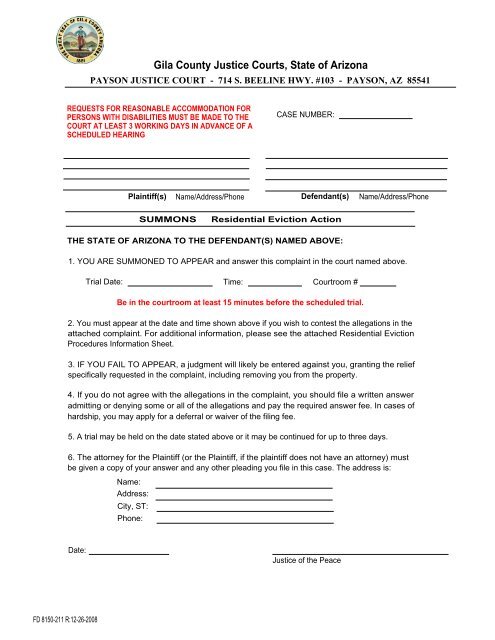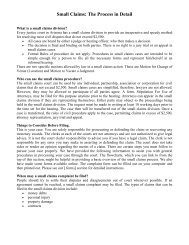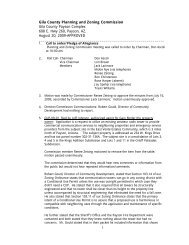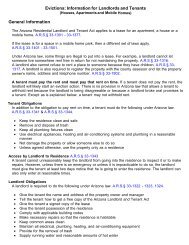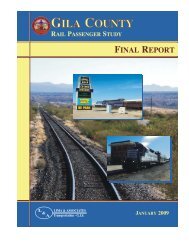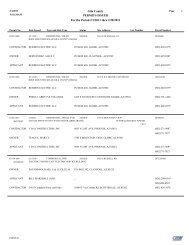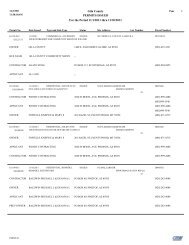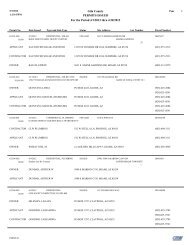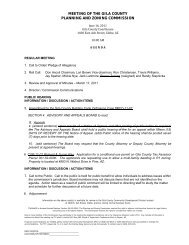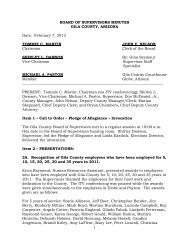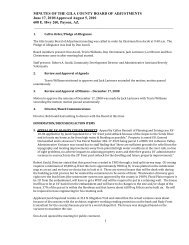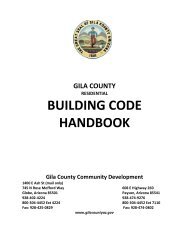Summons - Eviction - Gila County
Summons - Eviction - Gila County
Summons - Eviction - Gila County
Create successful ePaper yourself
Turn your PDF publications into a flip-book with our unique Google optimized e-Paper software.
<strong>Gila</strong> <strong>County</strong> Justice Courts, State of Arizona<br />
REQUESTS FOR REASONABLE ACCOMMODATION FOR<br />
PERSONS WITH DISABILITIES MUST BE MADE TO THE<br />
COURT AT LEAST 3 WORKING DAYS IN ADVANCE OF A<br />
SCHEDULED HEARING<br />
CASE NUMBER:<br />
Plaintiff(s)<br />
Name/Address/Phone<br />
Defendant(s)<br />
Name/Address/Phone<br />
SUMMONS<br />
Residential <strong>Eviction</strong> Action<br />
THE STATE OF ARIZONA TO THE DEFENDANT(S) NAMED ABOVE:<br />
1. YOU ARE SUMMONED TO APPEAR and answer this complaint in the court named above.<br />
Trial Date: Time: Courtroom #<br />
Be in the courtroom at least 15 minutes before the scheduled trial.<br />
2. You must appear at the date and time shown above if you wish to contest the allegations in the<br />
attached complaint. For additional information, please see the attached Residential <strong>Eviction</strong><br />
Procedures Information Sheet.<br />
3. IF YOU FAIL TO APPEAR, a judgment will likely be entered against you, granting the relief<br />
specifically requested in the complaint, including removing you from the property.<br />
4. If you do not agree with the allegations in the complaint, you should file a written answer<br />
admitting or denying some or all of the allegations and pay the required answer fee. In cases of<br />
hardship, you may apply for a deferral or waiver of the filing fee.<br />
5. A trial may be held on the date stated above or it may be continued for up to three days.<br />
6. The attorney for the Plaintiff (or the Plaintiff, if the plaintiff does not have an attorney) must<br />
be given a copy of your answer and any other pleading you file in this case. The address is:<br />
Date:<br />
Justice of the Peace<br />
FD 8150-211 R:12-26-2008
(Attorney's Name)<br />
(Attorney's Address)<br />
(Attorney's Bar Number)<br />
<strong>Gila</strong> <strong>County</strong> Justice Courts, State of Arizona<br />
CASE NUMBER:<br />
Plaintiff(s)<br />
Name/Address/Phone<br />
Defendant(s)<br />
Name/Address/Phone<br />
COMPLAINT - FORCIBLE / SPECIAL DETAINER<br />
Residential<br />
Mobile Home<br />
Commercial<br />
YOUR LANDLORD IS SUING TO HAVE YOU EVICTED, PLEASE READ CAREFULLY<br />
1. This court has jurisdiction to hear this case. The property is within this court's judicial<br />
precinct and is located at:<br />
2. The Defendant wrongfully withholds possession of this property.<br />
3. Any required written notice was served on the Defendant on<br />
served in the following manner:<br />
A copy of this notice is attached to this complaint.<br />
and was<br />
4. The Plaintiff is authorized to file this action and has done so for the following reason(s):<br />
RENT: The Defendant has failed to pay rent as agreed. The rent is unpaid since<br />
and had a prior unpaid balance of $<br />
The rental agreement requires rent to be paid each month on the<br />
the following amount: $<br />
day of each month in<br />
The lease provides for late fees and that the late fees be calculated in the following<br />
manner:<br />
Notice: If you are a residential tenant and the only allegation from your landlord is that<br />
you have not paid your rent, you may contact your landlord or your landlord's<br />
attorney and offer to pay all of the rent due, plus any reasonable late fees, court costs<br />
and attorney's fees. If you pay these amounts prior to a judgment being entered, then this<br />
case will be dismissed and your lease will be reinstated and will continue.<br />
FD 8150-212.01 R:12-26-2008
NON-COMPLIANCE: The Defendant committed. and has failed to remedy, a condition<br />
that is a material non-compliance of the rental agreement. Specifically, after receiving a<br />
notice to remedy the problem, the Defendant, on the day of<br />
20<br />
caused or allowed the following condition to occur:<br />
IRREPARABLE BREACH: The Defendant has committed a material and irreparable<br />
breach. Specifically, on the day of 20___, the Defendant did the<br />
following:<br />
OTHER:<br />
5. The Defendant owes a rental concession in the following amount: $<br />
of the rental concession (if any) is:<br />
The nature<br />
6. As of the date that this action is being filed, the Defendant owes the following:<br />
Rent (From Current and Prior Months) Totaling: $<br />
Late Fees:<br />
Rental Concessions:<br />
Costs:<br />
Attorney's Fees:<br />
Other:<br />
Total Amount Requested: $<br />
7. The Plaintiff requests a money Judgment for the amounts described above and also a Judgment<br />
for possession of the property.<br />
8. WRIT OF RESTITUTION: The Plaintiff requests the court issue a Writ of Restitution.<br />
returning the property to the Plaintiffs possession:<br />
5 days from the date of the judgment or 12 to 24 hours from the time of the judgment.<br />
(Applies to material and irreparable breach only)<br />
9. By signing this complaint, I verify that the assertions are true and correct to the best of my<br />
knowledge and belief and that they are based on a reasonably diligent inquiry.<br />
Plaintiff<br />
FD 8150-212.02 R:12-26-2008
RESIDENTIAL EVICTION INFORMATION SHEET.<br />
Notice A landlord must provide a tenant with written notice saying why the eviction process has<br />
started. The tenant should have received this notice before this lawsuit was filed.<br />
Rent cases If this lawsuit has been filed for not paying rent, the tenant can stop it and continue living<br />
in the residence by paying all rent now due, late fees, attorney's fees and court costs. After a judgment<br />
has been granted, reinstatement of the lease is solely in the landlord's discretion. Inability to pay rent is<br />
not a legal defense and the judge cannot give more time to pay, even if the tenant is having financial<br />
problems.<br />
Before Court <strong>Eviction</strong> cases move through the court system very quickly. If the tenant disagrees<br />
with the landlord's allegations, the tenant is encouraged to file a written answer. The answer form<br />
available from the court allows the tenant to admit or deny the allegations and explain his or her<br />
position. If the tenant cannot afford to pay the answer fee, he or she may apply for a waiver of that fee.<br />
If a tenant believes that the landlord owes him or her money, the tenant may under some<br />
circumstances file a counterclaim. The summons states that a trial will occur on the date listed, but due<br />
to the high volume of cases, a trial may not occur then. If the tenant fails to appear, and the landlord or<br />
his attorney is present, a judgment will probably be entered against the tenant. Tenants can represent<br />
themselves or arrange for lawyers to represent them. The court will not provide a lawyer.<br />
At Court At the time listed on the summons, the judge will start calling cases. If both parties are<br />
present, the judge will ask the tenant whether the complaint is true. If the tenant says no , he or she<br />
will need to briefly tell the judge why. If the reason appears to be a legal defense, the judge will need to<br />
hear testimony from both sides and make a decision after a trial. After talking to the landlord or its<br />
attorney, a tenant may wish to agree to what the landlord is requesting by signing a "stipulation". A<br />
stipulation is an agreement under which the parties resolve the dispute on the basis of what the<br />
agreement says. Only matters contained in the written agreement can be enforced. These<br />
agreements should be clear and understandable by both parties. Most stipulations include judgments<br />
against tenants. See below.<br />
Continuances Either party may ask that the court date be delayed. The court will agree only if there<br />
is a very good reason. A delay will be no more than three business days. There is no assurance a<br />
delay will be granted and parties should come to court prepared for trial and bring necessary witnesses<br />
and documents.<br />
After a Judgment If a landlord receives a judgment, it may apply for a writ of restitution to remove<br />
the residents. Writs of Restitution are served by constables, who will direct the residents to leave. A<br />
tenant may avoid the difficulties associated with a writ of restitution by vacating the property and<br />
returning the keys to the landlord. This ends his or her possession of the residence. If the tenant<br />
wants to continue to live in the residence after a judgment has been entered, the tenant will need to<br />
obtain the landlord's approval and sign a new lease. A tenant will have five (5) days to vacate the<br />
premises unless evicted for criminal activity, in which case the tenant has only twelve (12) to twentyfour<br />
(24) hours to vacate. A judgment will probably appear on a tenant's credit report for several years.<br />
Parties wishing to appeal from a judgment have five days to do so after the judgment is entered and<br />
can obtain forms and information from the court filing counter. If a tenant wants to remain in the rental<br />
home during the appeal, the tenant must also pay a ''supersedeas bond'' to suspend the judgment while<br />
the case is being reviewed. If the tenant prevails the court will dismiss the case.<br />
Sources of Additional Information You can get copies of the Arizona Residential Landlord Tenant<br />
Act, the Arizona Mobile Home Parks Residential Landlord and Tenant Act and the Long Term<br />
Recreational Vehicle Rental Space Act from a library or from the Secretary of State's office or web<br />
page: www.azsos.gov. In Maricopa <strong>County</strong> if you wish to consult an attorney, you may want to contact<br />
the Arizona State Bar Attorney Referrals Line at (602) 257-4434 or Community Legal Services at (602)<br />
258-3434. Contact the court in other counties for similar referrals. You can obtain a summary of the<br />
obligations of landlords and tenants on the web page for justice courts in Maricopa <strong>County</strong>:<br />
www.superiorcourt.maricopa.qov/justiceCourts/CourtsAndSections/<strong>Eviction</strong>s.asp


